1. About Crucial's budget SSD
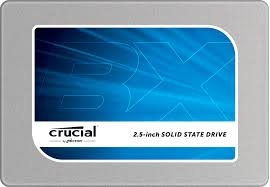 Crucial has recently released the BX100 series of SSDs, which are characterized as "entry-level" drives engineered to outperform a hard drive and deliver cost-effective performance.
Crucial has recently released the BX100 series of SSDs, which are characterized as "entry-level" drives engineered to outperform a hard drive and deliver cost-effective performance.
Available in capacities of 120GB, 250GB, 500GB and 1TB, the drive promises to deliver 535 MB/s sequential reads on both compressible and incompressible data.
Interestingly, Crucial has chosen to use the Silicon Motion's 2246EN controller with 16nm 128Gbit NAND, for these new drives, which is change from Crucial's usual Marvell designs. Obviously, SM2246EN is cheaper to procure than the equivalent Marvell part, although it should perform well.
Feature wise the BX100 does not support the features of the Crucial "M" series of SSDs, so there is no hardware-accelerated encryption or SLC caching.
Below you see the BX100's specs:
|
2.5" (7mm) SSD |
2.5" (7mm) SSD |
2.5" (7mm) SSD |
2.5" (7mm) SSD |
| Capacity |
120GB |
250GB |
500GB |
1TB |
| Part Number |
CT120BX100SSD1 |
CT250BX100SSD1 |
CT500BX100SSD1 |
CT1000BX100SSD1 |
| Box Contents |
2.5" (7 mm) SSD 7 mm – 9.5 mm spacer |
2.5" (7 mm) SSD 7 mm – 9.5 mm spacer |
2.5" (7 mm) SSD 7 mm – 9.5 mm spacer |
2.5" (7 mm) SSD 7 mm – 9.5 mm spacer |
| Sequential Read MB/s |
535 |
535 |
535 |
535 |
| Sequential Write MB/s |
185 |
370 |
450 |
450 |
| Random Read IOPS |
87k |
87k |
90k |
90k |
| Random Write IOPS |
43k |
70k |
70k |
70k |
As you can see, Micron/Crucial has managed to offer increased write speeds at the lower capacities, at least compared to the MX 100 series, which is based on the same NAND. The MX100 was limited to 300 MB/sec at 256GB and 150 MB/sec at 128GB. The BX100 shows a 70 MB/sec improvement at 250GB and a 35 MB/sec improvement at 120GB.
Our review sample has a capacity of 1TB and supports sequential read speeds of up to 535 MB/s, sequential write up to 450 MB/s and 90K/70K for random read and write IOPS, respectively.
2. Package, installation
The drive retails in the familiar for Crucial SSDs package you see below:
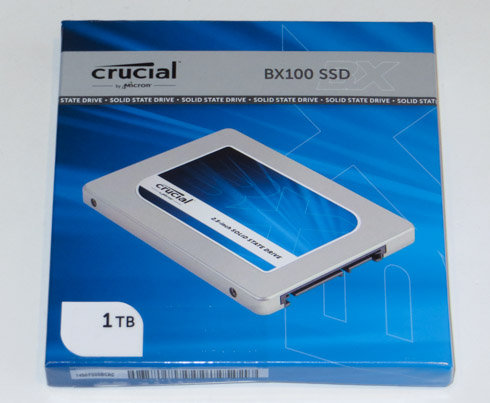
The BX100 SSD consists of a metal chassis, with a design that looks not so different than its the previous M-class SSDs. Its 2.5-inch, 7mm SSD enclosure has a sticker placed on the front side with as product information label.

The drive's slim 7mm profile allows the SSD fit into applications including notebooks, ultra-thin tablet PCs and ultrabooks. The drive is also rounded out on the edges with standard SATA power and data connectors on the front.
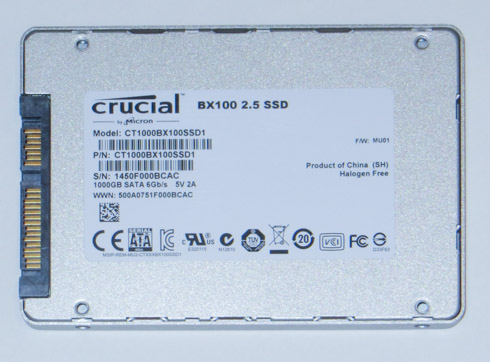

At the heart of the BX100 SSD is the Silicon Motion's 2246EN controller with 16nm 128Gbit NAND.
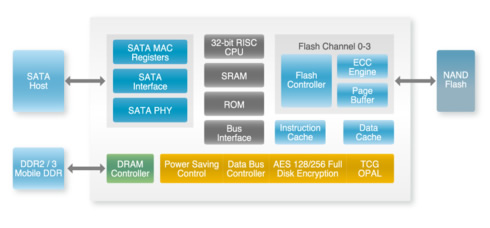
The 6Gb/sec SSD controller has a standard 4-channel configuration, though there are fewer steps in the pipeline as compared to SandForce and other controllers, which should help decrease latency and improve efficiency. There is also no compression engine, which means power consumption should be further reduced.
It supports sequential read performance of up to 540 MB/s and sequential write of up to 410 MB/s. it also delivers up to 80,000 random read IOPS and up to 75,000 random write IOPS.
SI claims that the controller's average power consumption is 60mW. It also features a configurable ECC engine that allows for consistent data throughput and performance throughout the entire SSD lifecycle.
The controller also supports high toggle, ONFI and asynchronous NAND.
The drive came with firmware Ver.MU01 installed and as you see below, the available capacity for the user is 953.87 MB (1 TB drive).
The readout on CrystalDiskInfo shows that NCQ and S.M.A.R.T. are enabled, as well as TRIM and DevSleep:
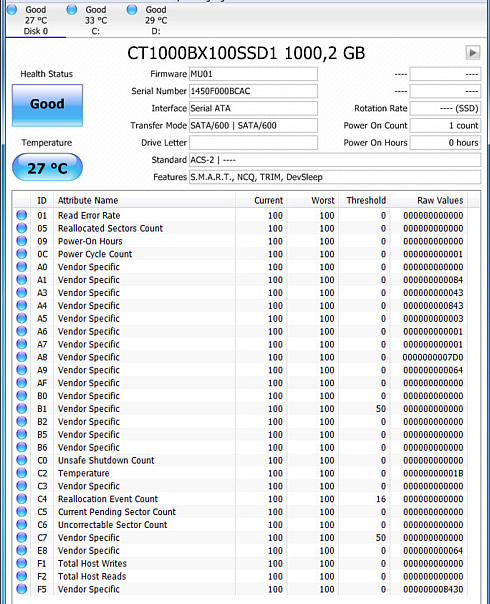
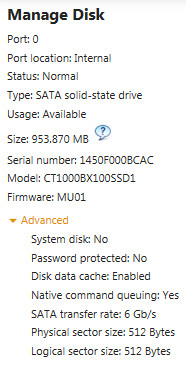
Finally, Crucial has launched its own toolbox for SSDs, called the Crucial Storage Executive. The 1.0 version is a toolbox with support for firmware updates, drive monitoring, secure erase and PSID revert. Supported drives are currently the M500, M550, MX100, MX200 and BX100 and the software is already available for download from Crucial's website.
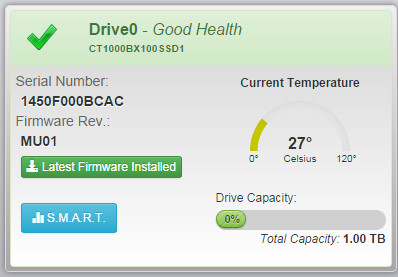
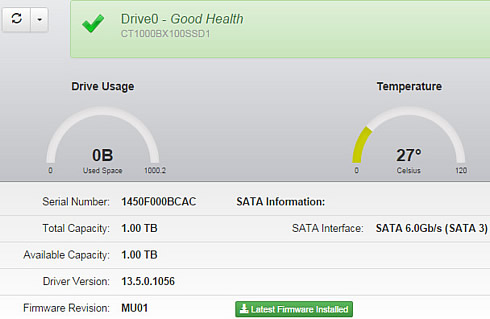
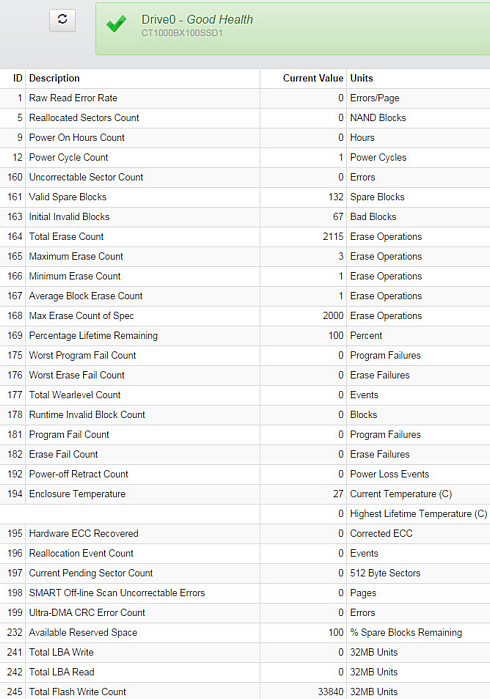
3. HDTachRW, HD Tune Pro
Here is our testbed:
- Shuttle SH81R4
- Processor: Intel i7 4790
- Graphics card: Club3D Radeon HD 6790 CoolStream Edition
- Memory: 2x8GB RAM DDR3-1600 Crucial
- SSD: 512GB Crucial MX100
- Monitor: LG L246WH-BH 24"
- Windows 7 x64 SP1 with latest updates installed
For the tests, we used the following software:
- HDTachRW v3.0.1.0
- HD Tune v4.50 Pro
- Crystal DiskMark v3
- ATTO Disk Benchmark v2.46
- ASS SSD Benchmark 1.5xxx
- IOMeter v2006.07.27 with Xtreme Benchmark template
- PCMark Professional edition v1.04
- Anvil Storage Utilities 1.0.34. Beta 11
The HDTachRW software you see in the first screenshot below measures the sequential read speed, the random access speed and sequential write speed of the BX100 SSD. Both read and write graphs look steady for the complete capacity of the drive. The average read speed was 401.7 MB/s and the corresponding speed for write was 328.5 MB/s.
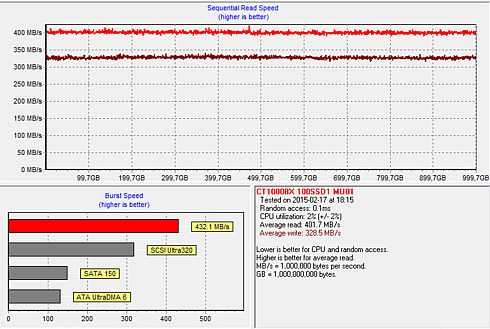
Obviously, in real world client scenarios it is unlikely that one would constantly write to the drive like HD Tach does.
We move on to the HD Tune Pro software, another utility we used to measure the drive's reading and writing performances. Although not necessarily representative of real-world workloads, HD Tune's targeted tests give us a glimpse of each drive's raw capabilities.
The BX100 SSD read the data sequentially at 374.2 MB/s (average). The access time was low at 0.12 msec:

As you see in the screenshot below, the writing speed was not very stable after the 650GB mark of the graph. That had a small impact to the overall average writing speed of the drive, which was logged at 306.1 MB/s.
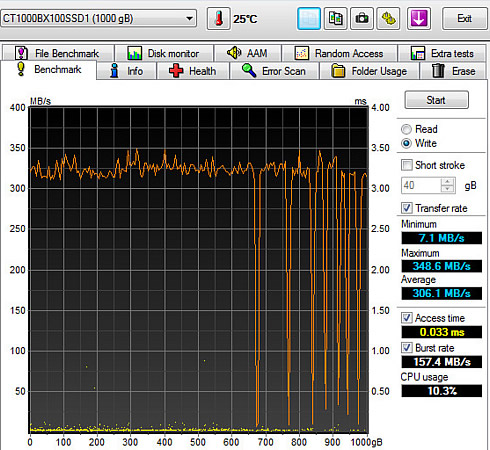
Below you see random reading test with files that varied in size:

4. ATTO Disk Benchmark
The next software we used was the ATTO Disk Benchmark. The tool measures storage systems performance with various transfer sizes and test lengths for reads and writes. The benchmark performs file transfers ranging from 0.5 KB to 8192 KB. ATTO and can be adjusted to do overlapped I/O, in a variety of queue depths. We tested the SSD using the benchmark's default settings, using 256KB file length performance and QD4. ATTO probably gives the most accurate results for compressible read and write data.

The BX100's reading and writing performance with compressible files was stable with files larger than 128KB. The read speed hit the 560MB/s and the write speed reached the 455 MB/s - both higher than the performance figures quoted by Crucial.
Let's take the performance with 4KB files. The BX100 1TB SSD was very fast in the reading part, as you see below:
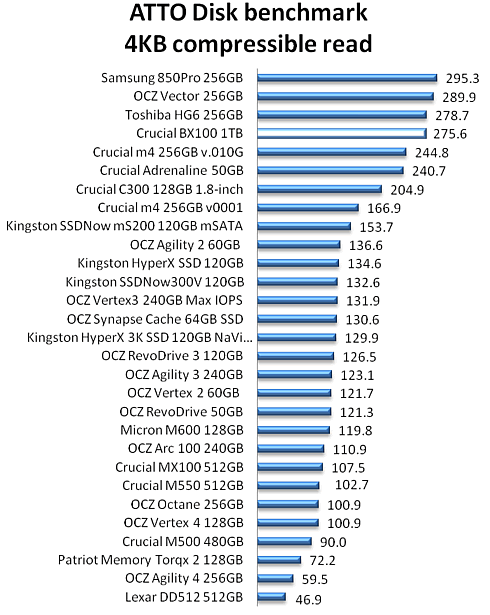
Writing of small 4KB files was a bit slower than the performance of the Crucial "M" series of SSDs:

Going further to larger 2MB file transfers, the BX100 SSD was very fast in the read test, and also managed to stay within expectations (for a budget SSD) in the write part:


5. CrystalDiskMark
The next benchmark is the CrystalDiskMark. The software provides throughput data based on sequential reads and writes, and random (512K/4K/4KQD32) reads and writes of various sizes.
Below you see the drive's performance with compressible and incompressible data and compressible data. The Silicon Motion's 2246EN controller treated the data in both cases in a similar manner:
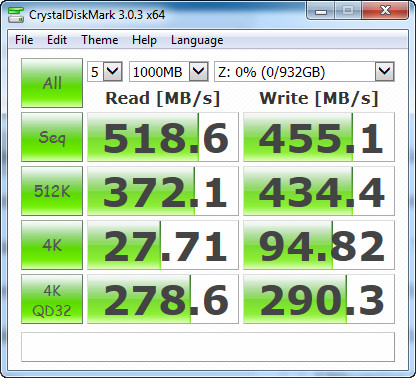
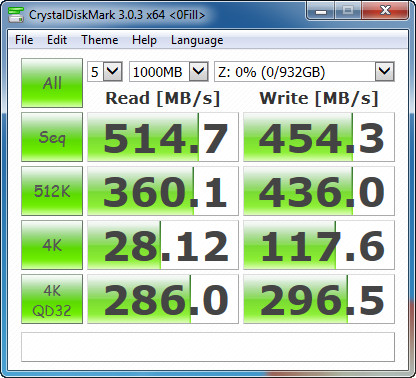
The results for the sequential reading and writing tests once again were close to what Micron had promised (specs).
The random 512KB read speed was average but lower than the MX 100's and the rest Crucial M series. Random reading of smaller 4K files was adequately fast, but it could be a bit faster in greater queue depths:

The drive's performance in the 512K random writing test (436 MB/s) was close to what the OCZ' ARC 100 SSD had given, and slower than the rest Crucial M series. 4K random writing was fast enough (117.6 MB/s), but 4K random QD32 write could be higher:

6. AS SSD benchmark
We move on with the AS SSD benchmark, which contains five synthetic as well as three practical tests. The synthetic tests determine the sequential and the random read / write performance of an SSD. These tests are carried out without using the operating system's cache. The Seq-test measures how long it takes to read and write an 1GB file. Most importantly, this sequential benchmark uses incompressible data for all of its transfers.
The 4K benchmark tests the read and write performance for random 4K blocks. The 4K-64-THRD-test corresponds to the 4K procedure except that here the read and write operations are distributed on 64 threads:

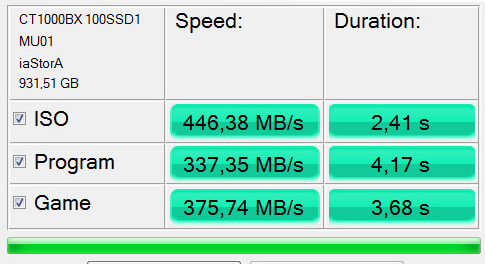
The software logged a 497.28 MB/s seq read and 421.81 MB/s in the write test - both pretty good for a budget drive. Below you see where the drive stands compared to other SSDs:
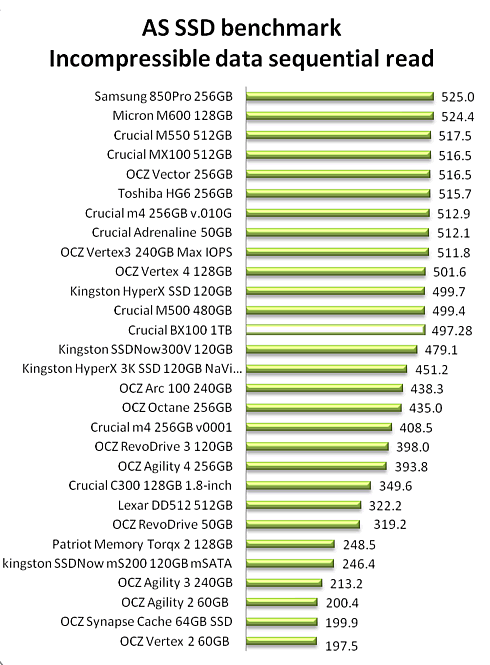

At the 4K random reading tests, the BX100 1TB SSD took the 8th place at the chart below, with an average reading speed of 22.5 MB/s.

The BX100 drive was fast at the 4K random writing tests, giving 82.4 MB/s:

The BX100 SSD kept giving a decent performance with multi-threaded requests for random reading of 4K incompressible files. The figures we got are close to the OCZ ARC 100's:
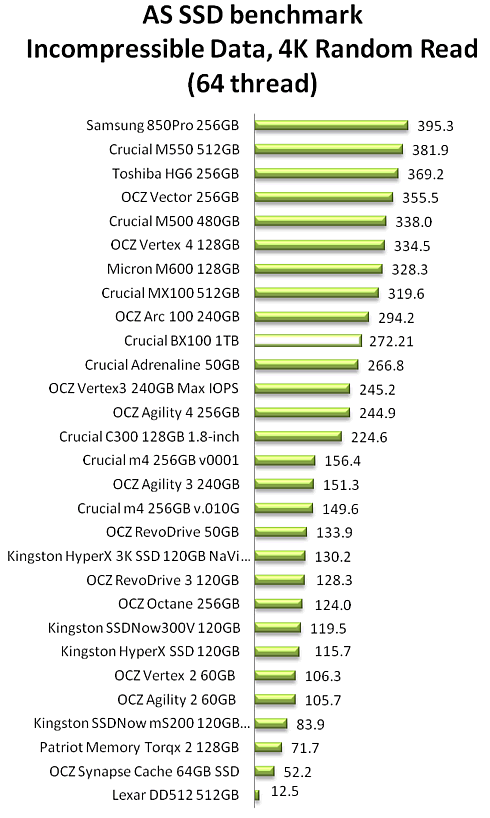
Multi-threaded random write of 4K files was not as fast as other SSDs:
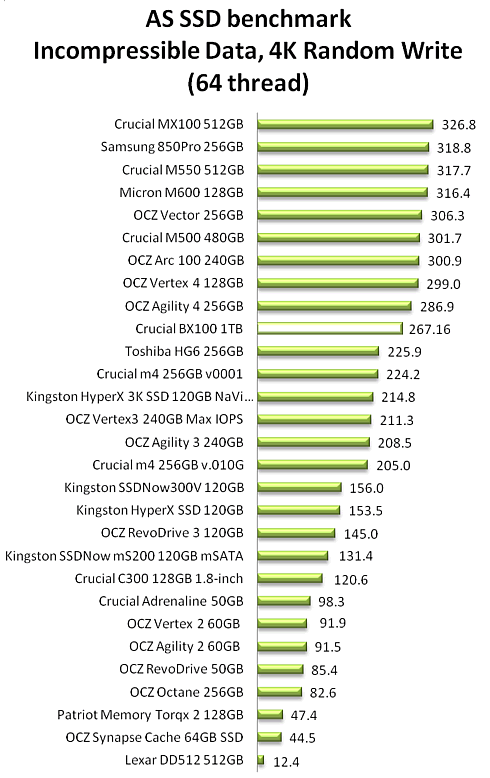
In the following graph you see how the Crucial BX100 1Tb SSD drive reads and writes files with a varied level of compression. This test creates test patterns on the target drive which are random and vary in the level of compression used in the test data. This ranges from 0% compressible to 100% compressible. The drive provided a stable and consistent performance through out the test.

7. IOMeter benchmark
This is the IOMeter benchmark. Iometer is run by using workstation and database patterns for queue depths (outstanding I/Os) representing very light and moderate loads. Iometer is both a workload generator (that is, it performs I/O operations in order to stress the system) and a measurement tool (that is, it examines and records the performance of its I/O operations and their impact on the system). The app's ability to bombard drives with an escalating number of concurrent IO requests also does a nice job of simulating the sort of demanding multi-user environments that are common in enterprise applications. The software can be used for measurement of the performance of an SSD. We started using the IOMeter tests using the Xtreme Benchmark template .
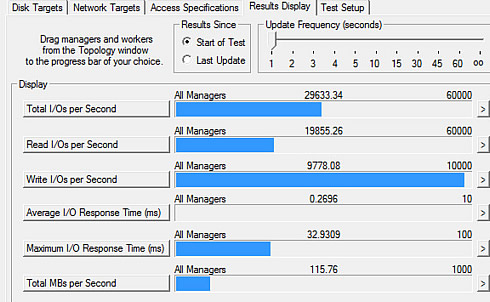
For the specific test, we used 100% random, 67%-33% Read/write distribution, aligned with the benchmarks we had already done in the past with other SSDs.
The Crucial BX100 1TB SSD performed pretty well in the both read and write tests, staying close to the top and even above Crucial's "M" series of SSDs. However, this should be also attributed to the large (1TB) capacity of our sample:



8. Anvil Pro
The next benchmark is the Anvil Pro, an ‘all inclusive’ storage utility. The software is tests transfer speeds as well as IOPS The IOPS tests can be configurable with preset testing scenarios for read (Seq 4MB, 4K, 4K QD4, 4K QD16, 32K and 128K), write (Seq 4MB, 4K, 4K QD4, 4K QD16) and mixed IO.
We used the software with the M600 SSD and tested the drive with 0-fill compression (RAW), 8% compression, 25% compression, 45% compression, 67% compression and finally 100 % (incompressible data). Below are the results with 0-fill compression as well as with fully incompressible files.


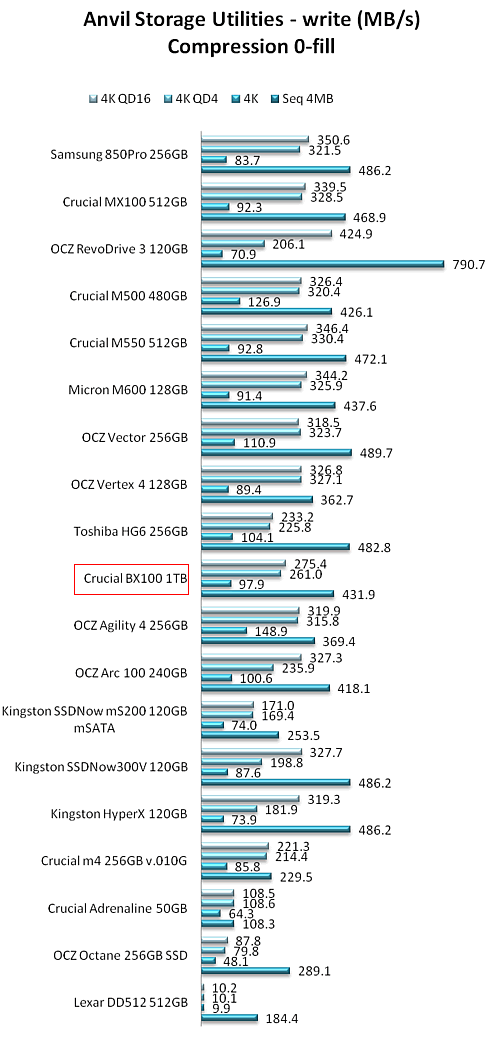

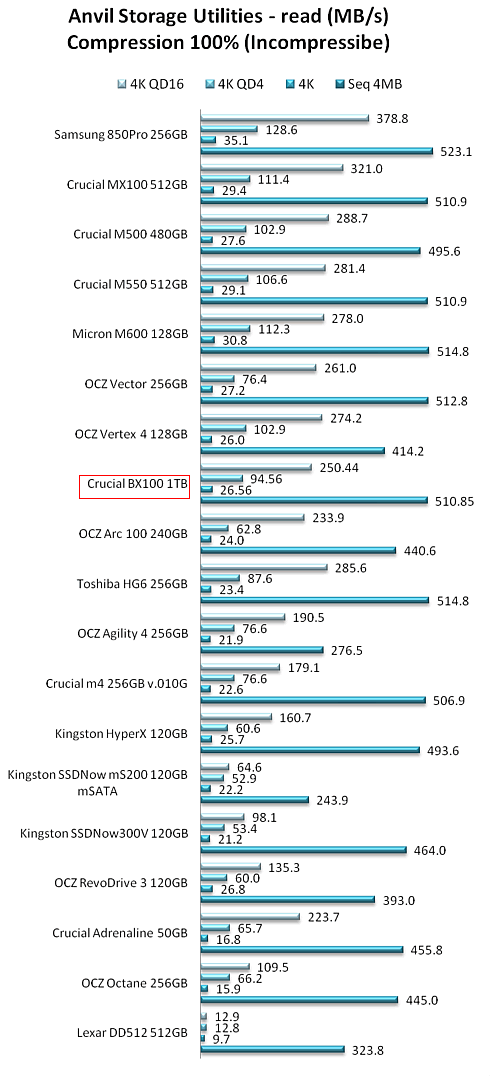
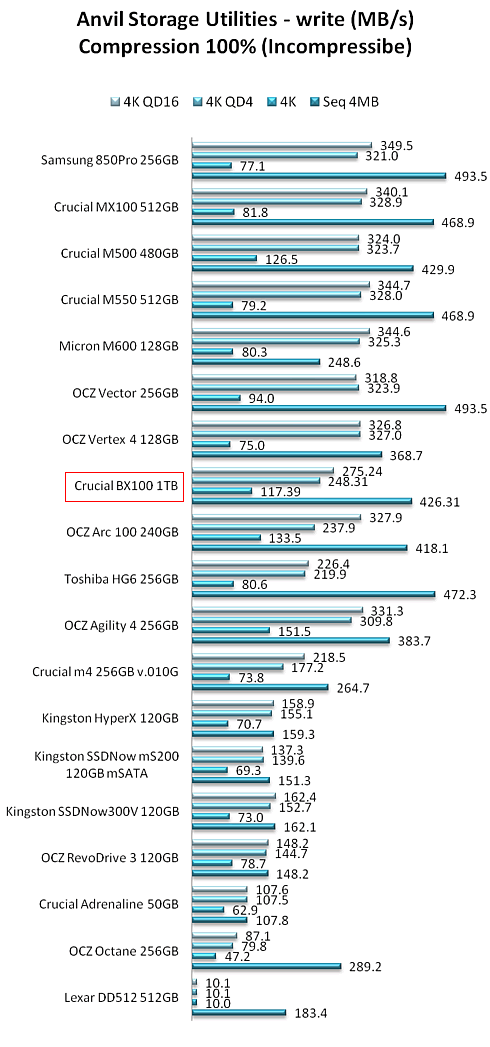
Below you see the overall total scores (read/write) of various SSDs. The BX100 1TB SSD stayed below the higher-end "M" series (Crucial):
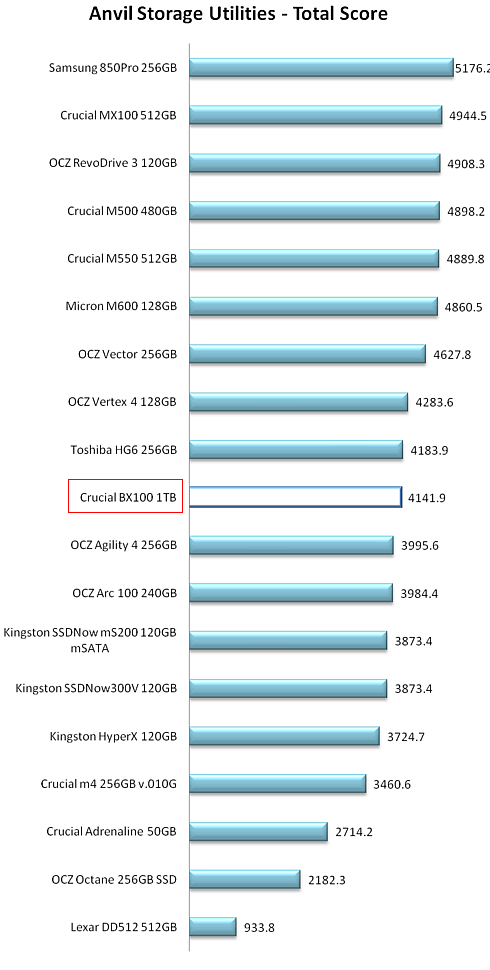
9. PCMark 7, PCMark 8
Below you see the results of Futuremark's PCMark 7 Professional edition. The software includes 7 PC tests for Windows 7, combining more than 25 individual workloads.
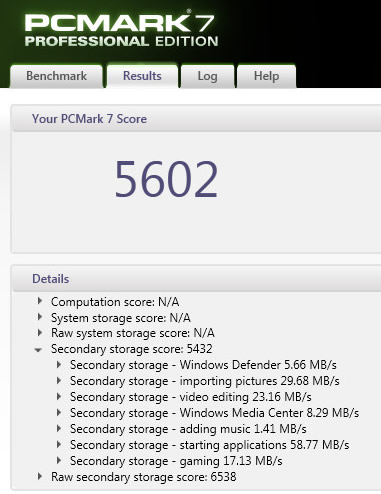
The BX100 1TB SSD scored 5432 points at the storage benchmark, which is a good score but lower than Samsung's 850 PRO.


We continue with the PCMark 8 Storage benchmark, which uses traces recorded from Adobe Creative Suite, Microsoft Office and a selection of popular games. Unlike synthetic storage tests, the PCMark 8 Storage benchmark highlights real-world performance differences between storage devices.
The BX100 SSD scored 4968 points.
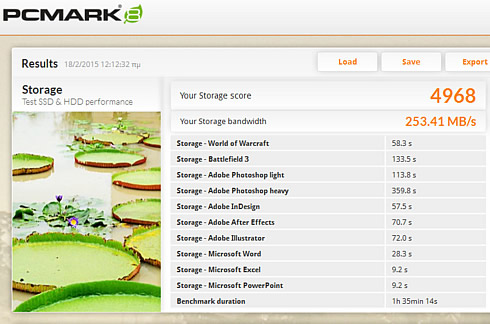
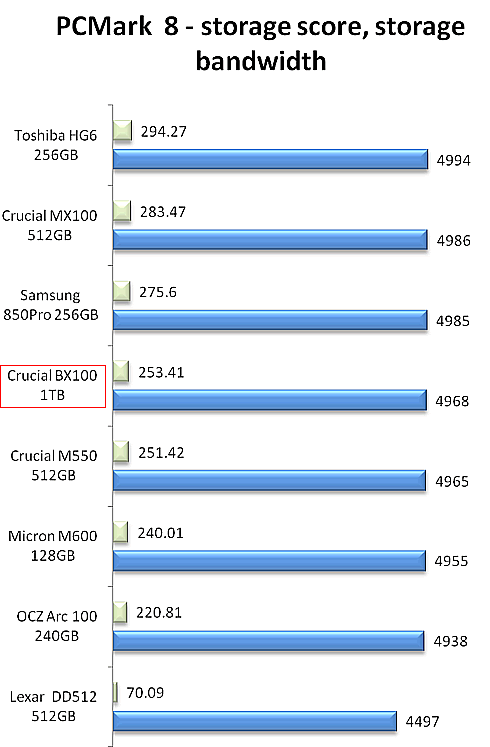
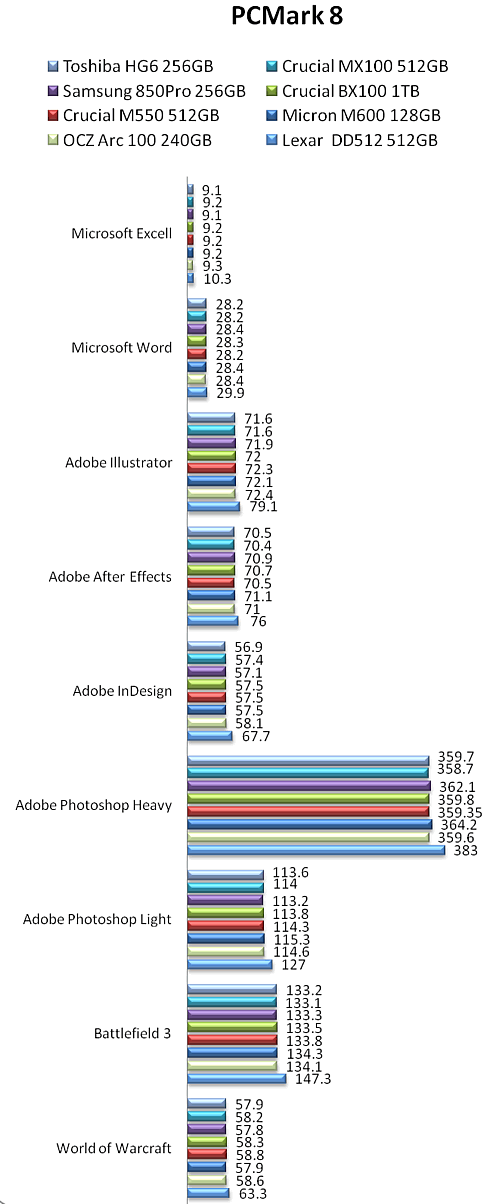
10. Summary
With the BX100, Crucial is offering a new line of economical SSDs aimed at users looking for an inexpensive way to upgrade their PCs or laptops and enjoy the benefits of a solid-state-based setup.
The 2.5" 7mm SSDs feature a SATA 6Gb/s interface, Micron MLC NAND, and a Silicon Motion SM2246EN controller, which proved to be a capable and energy-efficient replacement of the Marvell counterparts Crucial/Micron used so far in its SSDs.
Crucial has also included a 7mm-to-9.5mm adapter bracket for desktop users. In addition, the new Storage Executive software provides all of the necessary basics as far as secure erasure, reading SMART data, firmware updates, and usage monitoring. However, the interface runs in a browser, which may be cumbersome for users. It installs a service that runs in the background, communicating with the SSD and serving as a web host (defaulting on port 8080) for interacting with the HTTP-based GUI. Overall, the utility is simple and works well.
As it was expected, the BX100's low price tag comes with a performance cost. Designed by Crucial for "ultra affordability," the BX100 1TB SSD we tested will deliver solid sequential read and write speeds, especially with
2K - 2MB workloads during reading. Writing of 4K-2MB files was not as fast as other high-end SSDs, although it remain within the acceptable levels for budget solution.
Overall, the BX100's performance results were not surprising. But the drive's real strength remains its price. Without any doubt, the BX100 series will likely be an attractive drive for mainstream consumers interested in an inexpensive system upgrade.
The BX100 goes for roughly $70 for the 110GB model, $190 for the 500GB model and just $375 for the 1TB model ($0.375/GB). The latter is the most affordable 1TB SSD currently in the market.